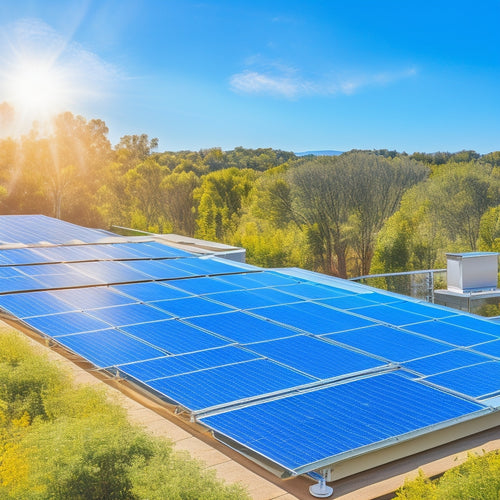
Renewable Energy Solar Panels
Share
By installing renewable energy solar panels, you can take control of your energy costs and reduce your reliance on the grid by up to 100%, making it possible to eliminate your energy bills entirely. You'll enjoy predictable, low-cost energy for years, with potential annual savings of $1,000 or more. Plus, solar panels can increase your property value, attracting potential buyers and providing a competitive edge in the real estate market. With maximum efficiency ratings and ideal power output, you'll be generating more electricity and reaping the benefits. Now, investigate the specifics of solar panel types, efficiency, and performance to maximize your investment.
The Essentials
- Solar panels provide energy independence and cost savings, with potential annual savings of $1,000 or more based on energy usage and rates.
- Installation of solar panels increases property value, attracting potential buyers and selling homes faster and at higher prices.
- High-efficiency solar panels with maximum conversion rates enable more electricity generation from sunlight, leading to superior energy production and savings.
- Solar energy is a sustainable, eco-friendly solution, reducing reliance on fossil fuels, greenhouse gas emissions, and providing long-term price stability.
- Federal tax credits and low maintenance costs make solar panels a cost-effective investment, with installation costs ranging from $15,000 to $30,000.
Zero Energy Bill Possibility
You can achieve energy independence today by utilizing the power of renewable energy solar panels. By installing a solar panel system that matches your energy needs, you'll greatly reduce your reliance on the grid, and potentially zero out your expenses.
With a well-designed system, you can break free from fluctuating Energy Efficiency costs and enjoy predictable, low-cost energy for years to come. Additionally, by switching to solar power, you'll not only save money but also contribute to a cleaner and more sustainable future, reducing your carbon footprint and reliance on traditional energy sources.
Energy Independence Today
Achieving energy independence is becoming a tangible reality, thanks to the rapid advancement of renewable energy technologies, particularly solar panels. You're now closer to breaking free from the grid and enjoying energy autonomy.
With solar innovations continuously improving, you can utilize the power of the sun to generate electricity, reducing your reliance on fossil fuels. Integrated solar solutions, such as All in One Solar Power Systems, simplify the shift to renewable energy, ensuring a steady power supply even when the grid is down.
As you shift to renewable energy, you'll experience a significant decrease in your energy bills. Solar panels can be designed to meet your specific energy needs, ensuring you have a consistent supply of electricity.
With energy storage solutions, such as batteries, you can store excess energy generated during the day for use during the night or on cloudy days.
Zero Out Expenses
Solar panels can greatly reduce energy bills, but the ultimate goal for many is to eliminate them altogether. By embracing a cleaner, more sustainable future with Renewable Energy, individuals can markedly reduce their carbon footprint and contribute to a healthier environment for future generations.
You can achieve this by investing in a well-designed solar panel system that meets your energy needs. To zero out your expenses, you'll need to evaluate the installation costs and verify that your system is large enough to cover your energy usage.
A typical residential solar panel system can cost between $15,000 and $30,000, depending on the size and quality of the equipment. However, with the current federal tax credit, you can claim up to 26% of the total cost as a tax deduction.
Additionally, you'll need to factor in solar panel maintenance, which is relatively low and can be as little as $100 per year. By generating your own clean energy, you'll not only reduce your reliance on the grid but also enjoy considerable savings on your energy bills.
With a well-maintained system, you can expect to save up to $1,000 per year or more, depending on your energy usage and local electricity rates.
Increases Property Value Fast
You'll find that installing solar panels on your property can greatly enhance its value, making it more attractive to potential buyers if you decide to sell.
In fact, studies have shown that solar-equipped homes sell faster and for higher prices than those without.
With the average cost of a solar powered house being relatively affordable, it's no wonder why homeowners are opting for residential solar installation to increase their property's appeal.
Boosts Real Estate Sales
Installing renewable energy solar panels can greatly enhance real estate sales by increasing property value fast, as it becomes a major selling point for environmentally conscious and cost-savvy homebuyers.
You'll benefit from increased demand, as eco-friendly features top the list of must-haves for many modern buyers. In fact, studies show that homes with solar panels sell faster and for more money than those without.
This trend is driven by market trends, as consumers become more aware of the long-term financial and environmental benefits of renewable energy. By installing solar panels, you'll not only attract more buyers but also give yourself a competitive edge in a crowded market.
As a result, you'll enjoy a faster sale and a higher selling price, giving you the freedom to move forward with your plans. With solar panels, you'll be ahead of the curve, capitalizing on the growing demand for sustainable living and reaping the rewards of a smart investment.
Adds Lasting Value
Renewable energy solar panels not only enhance real estate sales but also add lasting value to your property. By installing solar panels, you're making a sustainable investment that pays off in the long run.
According to a National Renewable Energy Laboratory study, solar panels can increase your property value by up to $15,000. This increase in value is due to the long-term savings homeowners can enjoy from reduced energy bills. With solar panels, you're generating clean energy and reducing your reliance on the grid, which translates to significant cost savings over time.
In addition to the financial benefits, solar panels also enhance your property's appeal to potential buyers. As the demand for eco-friendly homes continues to rise, having solar panels installed can be a major selling point.
Maximum Efficiency Ratings Matter
When selecting solar panels, you'll want to prioritize maximum efficiency ratings, as they directly impact the system's performance.
High conversion rates are vital, as they enable your solar panels to generate more electricity from the same amount of sunlight.
Remarkably, top brands like Tesla and SunPower are known for their high-efficiency solar panels, which can greatly enhance your energy output.
Ideal power output, in turn, guarantees you're getting the most value from your investment.
High Conversion Rates
Two crucial factors determine how much electricity your solar panels can generate: the amount of sunlight they receive and their conversion rate. The latter is a significant aspect of solar panel technology, as it directly affects the amount of energy you can utilize from the sun.
High conversion rates are essential to maximize your energy output. Solar panels with high conversion rates can turn a larger percentage of sunlight into usable electricity.
Recent solar efficiency advancements have led to significant improvements in conversion rates. You can now find solar panels with conversion rates exceeding 22%, up from around 15% just a decade ago.
When selecting solar panels, look for those with high conversion rates. A higher conversion rate means you'll need fewer panels to generate the same amount of electricity, saving you space and money.
Additionally, high-efficiency solar panels often come with longer warranties and better durability, ensuring you'll enjoy the benefits of renewable energy for years to come.
Optimal Power Output
Your solar panel system's ideal power output hinges on the maximum efficiency ratings of its individual components. As you aim for superior power output, it is important to take into account the solar panel efficiency of each component. The amount of sunlight exposure your panels receive also plays a significant role in determining the overall power output.
Here is a breakdown of the maximum efficiency ratings for different types of solar panels:
| Type | Maximum Efficiency Rating | Ideal Sunlight Exposure |
|---|---|---|
| Monocrystalline | 22.8% | Direct sunlight (2-3 hours) |
| Polycrystalline | 20.6% | Partial shading (1-2 hours) |
| Thin-Film | 14.2% | Indirect sunlight (0.5-1 hour) |
| Bifacial | 23.2% | Direct sunlight (2-3 hours) + rear-side reflection |
| Perovskite | 25.5% | Direct sunlight (2-3 hours) + high-temperature tolerance |
Check Wattage Per Hour
When selecting a solar panel, you'll want to check the wattage per hour to guarantee it meets your energy needs. This involves understanding the panel's peak power output, which is the maximum amount of electricity it can produce under ideal conditions.
For instance, integrating renewable energy systems with advanced battery solutions can generate clean energy and save on electricity bills.
You'll also need to calculate the energy per hour, which is the total amount of electricity the panel can generate in a single hour.
Peak Power Output
Peak Power Output (Check Wattage Per Hour)
When you're evaluating solar panels, understanding peak power output is vital. This metric represents the maximum amount of power your solar panel system can produce under ideal conditions, usually measured in watts (W). You'll often see it listed as the "watt-peak" rating on your solar panel's spec sheet.
Peak power output is directly tied to solar panel efficiency, which is the percentage of sunlight converted into usable electricity. A higher peak power output means more energy production, which translates to greater savings on your utility bills.
To put this into context, reflect that a typical residential solar panel system might've a peak power output of around 5 kilowatts (kW). This means that under favorable conditions, your system can produce 5,000 watts of electricity.
When you're comparing different solar panels, be sure to take into account their peak power output and efficiency ratings to guarantee you're getting the most energy production out of your system. This will help you maximize your return on investment and achieve energy independence.
Energy Per Hour
Solar panel systems produce energy in real-time, and understanding energy per hour is essential for evaluating their performance. You need to know how much energy your solar panel system generates per hour to determine its efficiency and overall value.
Hourly energy production depends on various factors, including the system's peak power output, solar irradiance, and temperature.
To calculate energy per hour, you'll need to take into account the system's wattage rating and its capacity factor. The capacity factor represents the percentage of the system's maximum potential output that it actually produces. For instance, a system with a 5 kW peak power output and a capacity factor of 0.8 would produce 4 kW of power per hour. This translates to 4 kWh of energy per hour, assuming a one-hour period.
Understanding energy per hour helps you evaluate your solar panel system's performance and identify opportunities for improvement. By optimizing your system's solar panel efficiency, you can increase its hourly energy production and enjoy greater freedom from reliance on the grid.
Lower Carbon Footprint Guaranteed
You're switching to a renewable energy source with solar panels, which guarantees a lower carbon footprint.
By utilizing energy from the sun, you're reducing your reliance on fossil fuels and mitigating climate change.
As an eco-friendly energy source, solar power greatly decreases greenhouse gas emissions, making it an essential step towards a sustainable future.
Eco-Friendly Energy Source
Utilizing renewable energy from the sun reduces your reliance on fossil fuels, thereby minimizing the carbon footprint of your energy consumption. As a result, you'll contribute less to climate change and air pollution.
Solar panels, being an eco-friendly energy source, offer a sustainable solution for your energy needs.
You'll be pleased to know that solar panels are made from sustainable materials, ensuring a lower environmental impact throughout their lifecycle.
Furthermore, advancements in solar innovations have increased their efficiency, allowing you to generate more energy while reducing your carbon footprint.
With solar panels, you'll enjoy a clean and reliable source of energy, unaffected by price fluctuations or supply chain disruptions.
Frequently Asked Questions
Can Solar Panels Be Installed on Old or Damaged Roofs?
Before installing solar panels, you'll need a thorough roof assessment to determine if your old or damaged roof can support the added weight and stress. Consider factors like structural integrity, roofing materials, and potential repairs or replacements before installation.
Do Solar Panels Produce Electricity During Power Outages?
When the grid goes dark, you're left in the dark, but with the right setup, you can be your own island of power, utilizing grid independence and emergency power, so yes, you'll still get electricity during outages, as long as you've got a battery backup system in place.
How Often Should Solar Panels Be Cleaned and Maintained?
You'll want to clean your solar panels every 6-12 months to maintain ideal energy output, as dirt and debris can reduce efficiency; however, the exact frequency depends on your location and the panel's durability.
Are Solar Panels Resistant to Extreme Weather Conditions?
As you weather life's storms, you'll find solace in knowing that solar panels, like a steadfast anchor, are engineered to withstand turbulent skies, boasting durability that shields against extreme weather conditions, ensuring unyielding energy independence.
Can Solar Panels Be Used for Heating Water and Homes?
You can employ solar water heating systems, which capture sunlight to warm water, increasing heating efficiency. These systems can provide up to 80% of your hot water needs, freeing you from reliance on traditional energy sources.
Final Thoughts
As you weigh the benefits of renewable energy solar panels, the future of your energy consumption hangs in the balance. Will you seize the opportunity to slash your energy bills to zero, elevate your property value, and shrink your carbon footprint? The fate of your wallet and the planet rests on your ability to maximize efficiency ratings, scrutinize wattage per hour, and guarantee a cleaner tomorrow. The clock is ticking - will you tap into the power of solar energy today?
Related Posts
-

What Types of Solar Energy Devices Are Available
You'll find several types of solar energy devices available today, each customized to different energy needs. Photovo...
-

Best Solar Powered Flashlights for Emergency Situations
When you're choosing the best solar-powered flashlights for emergency situations, focus on their brightness, battery ...
-

Smart Grid Technology Implementation Challenges
You'll encounter several challenges when implementing smart grid technology, particularly in cost management, scalabi...


